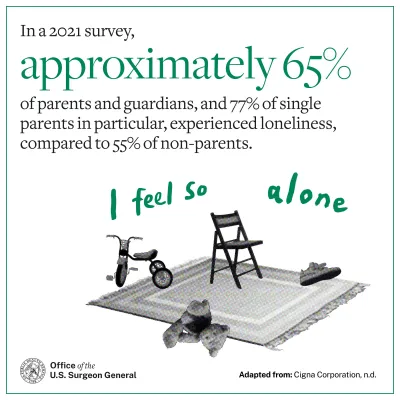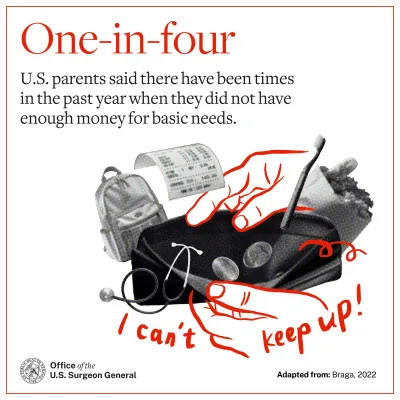Addressing the Parent Mental Health Crisis
PSYC Professor Asserts that 'Caregivers Need Care, Too'
Recently, United States Surgeon General Dr. Vivek Murthy released a Surgeon General’s Advisory on the Mental Health and Well-Being of Parents, which outlines the critical levels of stress that American parents and caregivers are facing.
According to the advisory, parents in the United States are struggling with overwhelm, loneliness and isolation—and both parents and children are facing unrealistic expectations exacerbated by social media. Parents are exhausted, and it most certainly affects their children.
Andrea Chronis-Tuscano, the Joel and Kim Feller Endowed Professor in the Department of Psychology, has studied parent mental health—and has been offering support and strategies for parents and caregivers—for decades.
As a researcher with expertise in Attention-Deficit/Hyperactivity Disorder, a disorder with a strong genetic component, Chronis-Tuscano has also highlighted the strong links between the mental health and wellness of parents and their children. In the case of ADHD, Chronis-Tuscano said that parents with the disorder have trouble following treatment recommendations to provide structure and organization for their children if they struggle with the same executive function difficulties themselves.
“If we don’t help parents manage their own ADHD, they cannot help the child manage theirs,” Chronis-Tuscano said. “Parents in general tend to put their own needs aside for the benefit of their children, but if they are left depleted they cannot put energy into their kids.”
Chronis-Tuscano is pleased to see that the surgeon general’s advisory has put the need for parental and caregiver support in the limelight.
“We have been talking about the youth mental health crisis since the pandemic. This advisory emphasizes that there is also a parent mental health crisis that needs attention,” Chronis-Tuscano said. “The more we highlight the impacts of parent mental health on child well-being, it will raise awareness of the dire need for clinical resources, research, funding and policy changes to support our nation’s parents.”
Making Connections, Overcoming Barriers
This new focus on the mental health of parents is not just a “nice-to-have” development, it is a critical component to improving the overall health and well-being of children and families.

“We are finding that if you leave parents' mental health unaddressed, you can only get so far with helping the child,” Chronis-Tuscano said. “When we evaluate children, we need to ensure that the family health history screenings we typically gather for physical health conditions like diabetes or heart disease, also ask about family history of mental health disorders.”
Citing that routine screening for postpartum depression in the parents is now routine at infant pediatric visits, Chronis-Tuscano suggests that parent mental health screenings might be expanded further into primary care visits.
Access to care and stigma around mental health are often barriers to care for many families. Chronis-Tuscano has worked with many healthcare settings and schools to make evidence-based screening and treatment for ADHD more accessible to youth and families who may never pursue treatment in mental health settings.
Additionally, Chronis-Tuscano’s work helped parents and communities across the nation during the height of the COVID-19 pandemic, as she was one of the first researchers to offer practical tools and solutions to parents who were facing the unique challenges of keeping their children safe, educated and cared for during that isolating, confusing, dangerous time.
Parents were putting their kids first during the pandemic, Chronis-Tuscano said, but that experience took a toll on parents and caregivers.
Sharing Strategies that Serve Parents
Many of the strategies that Chronis-Tuscano shared with parents during the pandemic hold true today, especially as parents and kids alike continue to face stress at home, at school, online and beyond.
“When our goal is to improve the mental health of children, we must continue to make the mental health of parents a priority,” Chronis-Tuscano said.
Some strategies to promote health and well-being that Chronis-Tuscano encourages parents and caregivers to consider are:
- Prioritizing parent sleep, exercise, mental health and wellness
- Learning and practicing mindfulness
- Letting go of unhelpful comparisons, often brought on by social media consumption; thoughts like “She has it all together” or “I can’t keep up with what others are doing for their kids.” Allow room for imperfection.
- Prioritizing tasks that actually have to be done today, and what things aren’t as urgent. Ask for or hire support when possible. You cannot do it all!
- Having honest conversations with other parents in your social circle so you can support each other
“It’s difficult for many parents and caregivers to make themselves a priority,” Chronis-Tuscano said. “You have to give yourself permission to get creative, to find ways to get more sleep and exercise, and to carve out time for yourself.”
One parent that Chronis-Tuscano worked with found that she was faced with a familiar problem every day: the moment she arrived home from work, her family would meet her with questions, problems and requests. She decided to park a few blocks from her home, take a 20 minute walk to clear her mind, then get in her car and drive the rest of the way home, more prepared to face the demands of family life.
“There are lots of little strategies that can make a big difference,” Chronis-Tuscano said. “Don’t fall into the trap of ‘all or nothing.’ You don’t have to turn into a marathon runner to improve your health—you can simply take a walk with a neighbor a couple of times per week. You don’t have to stop doing housework altogether—you can just choose to tackle one task a night versus three. You don’t have to drastically change your sleep schedule; even adding 30 extra minutes of sleep when you can can make a big difference.”
An Uneven Landscape of Support
Chronis-Tuscano emphasized that not all parents can equally afford to make even small changes to prioritize themselves. Socioeconomic factors can often come into play.

The Surgeon General’s report highlighted that 25% of parents in America have financial concerns around meeting basic needs. Parents most in need of support are those living in poverty, and in dangerous neighborhoods. They are disproportionately stressed, isolated, and in need of policy changes and social support.
“When you are a parent worried about putting food on the table, that’s a different kind of worry—you can’t just buy convenience meals at the grocery store to save yourself the stress of cooking or hire someone to help with the cleaning. If you are worried about safety in your neighborhood, it’s not so simple to go on a walk,” she said. “It is critical for these types of disparities to be acknowledged when it comes to considering policies and funding that can help to support parents and alleviate parental stress.”
While it is good that this public health crisis is now getting more attention, Chronis-Tuscano said it is important to maintain awareness and momentum to pursue solutions.
“We need to keep talking, to build up communities, even online communities,” Chronis-Tuscano said. “If nothing else, parents should recognize that when they can and do make themselves a priority, their families will benefit from their improved mental health and well-being, too.”
Published on Tue, Sep 10, 2024 - 4:02PM




